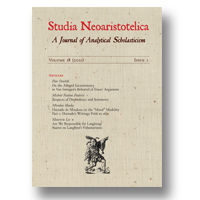|
1.
|
Studia Neoaristotelica:
Volume >
20 >
Issue: 2
David Botting
Anti-Platonism in De Anima III.5
abstract |
view |
rights & permissions
| cited by
Famously, Plato argues that the soul pre-exists the body, continues to exist after the body dies, and can come to exist afterwards in another body. Aristotle argues against the transmigration of souls in On Generation and Corruption and for the most part appears not to endorse these Platonic doctrines. But in De Anima III.5 Aristotle also seems to argue that a part of the soul, usually dubbed the nous poiētikos, is separable from the body and eternal. This has presented interpreters of Aristotle with a problem: how can we reconcile Aristotle the naturalist philosopher with the apparently Platonist philosopher of De Anima III.5? Can we understand Aristotle’s position in De Anima III.5 in a way that does not conflict with the anti-Platonism he expresses in texts like On Generation and Corruption? I will argue that we can and offer an interpretation of De Anima III.5 that does not commit Aristotle to the position that the human soul is eternal. Even if Plato is right about the concept of the human soul, about what the human soul is in its own nature, he is wrong on ontological grounds. There are no eternal human souls.
|
|
|
2.
|
Studia Neoaristotelica:
Volume >
20 >
Issue: 2
Miroslav Hanke
Science as Pretence:
Fictionalism in Late Medieval Nominalism
abstract |
view |
rights & permissions
| cited by
The paper addresses the concept of useful fiction in texts authored by the fourteenth-century nominalists Henry Harclay, William Ockham, John Buridan and Nicholas Oresme. Three fundamental ideas related to fictionalism will be documented. First, the view that statements about fictions are covert conditionals with impossible antecedents. Second, the view that the primary concern with fictions is their practical utility, i.e., applicability in the context of a scientific discipline. Third, the view that it is useful to pretend that fictions of a certain kind can be used uniformly to represent physical reality, such that a natural phenomenon A is pretended to be a B, where Bs themselves are only pretended to be real.
|
|
|
3.
|
Studia Neoaristotelica:
Volume >
20 >
Issue: 2
Claus A. Andersen
Middle Knowledge in the Middle of the 17th Century:
Notes on a Recent Book by Sven K. Knebel
abstract |
view |
rights & permissions
| cited by
The year 2021 saw the publication of Sven K. Knebel’s new book on Middle Knowledge. It is an exceedingly important research publication which deserves scholarly attention. The book contains a long introduction (consisting of various studies) and an edition of the fourth book of the Irish Jesuit theologian Luke Wadding’s incomplete work on scholastic theology. This present review article first recapitulates the origins and historical significance of the doctrine of Middle Knowledge. Then Knebel’s book as well as the career of Luke Wadding are introduced. I then discuss the place of Wadding’s work in the Jesuit discourse of ‘concordia’ and its relation to Molinism. In the subsequent sections, I investigate various doctrines defended by Wadding. These include his view of disjunctive necessity, his variant of the doctrine known as ‘connectionism’, and his use of various kinds of distinctions in theology. The study concludes with a critical assessment of Knebel’s publication. Despite all praise, I disagree with Knebel’s all too pessimistic view of the research landscape: We will soon be pondering over why Early Modern scholasticism has received so much attention in recent scholarship, rather than why it did not do so in the past.
|
|
